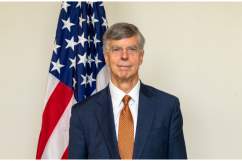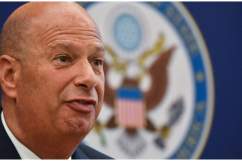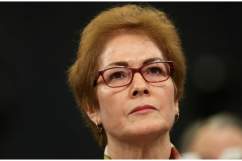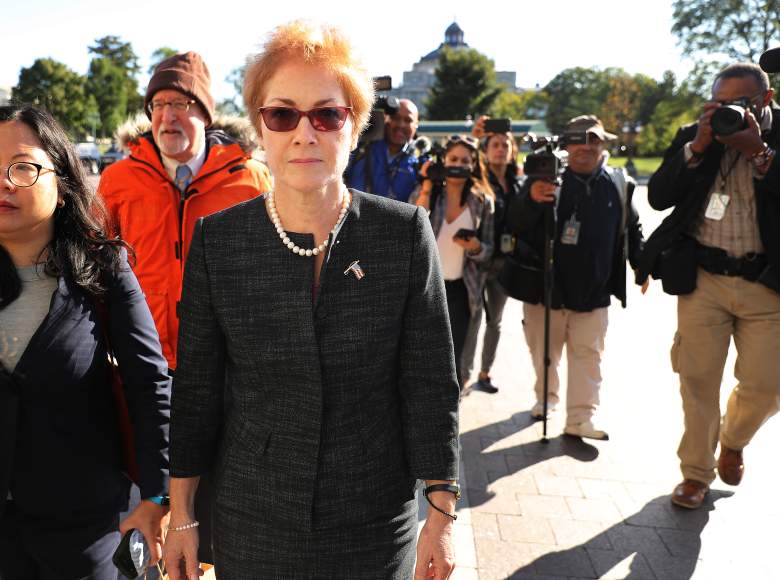
Getty Former U.S. Ambassador to Ukraine Marie Yovanovitch is surrounded by lawyers, aides and journalists as she arrives at the U.S. Capitol October 11, 2019 in Washington, DC.
Marie Yovanovitch, former U.S. ambassador to Ukraine, testified at a public hearing before the House of Representatives in November 2019 as part of the impeachment investigation against President Donald Trump.
Marie Yovanovitch joined the U.S. Foreign Service in 1986, according to an official State Department bio. She was abruptly recalled to Washington on May 20, 2019.
According to a “Memorandum of Telephone Conversation” between President Donald Trump and Ukrainian President Volodymyr Zelensky on July 25, Trump said Yovanovitch was “bad news” and that she was going to “go through some things.”
Evidence submitted by Lev Parnas on Tuesday show that he had conversations with Robert Hyde, a Trump donor and former Republican congressional candidate, about surveilling Yovanovitch in Ukraine. “They know she’s a political puppet,” Hyde texted to Parnas. “They will let me know when she’s on the move… They are willing to help if you/we would like a price.”
Yovanovitch has served in several overseas posts, including Ottawa, Moscow, London and Mogadishu. She has served as ambassador under three U.S. presidents: George W. Bush, Barack Obama and Donald Trump. Yovanovitch has been awarded the Senior Foreign Service Performance Award six times and the Presidential Distinguished Service Award and the Secretary’s Diplomacy in Human Rights Award.
“She’s a career diplomat,” NPR’s Steve Inskeep said. “Unlike some ambassadors who are friends or supporters of a president, she served whoever was in the White House. Ukrainians say she was professional and worked hard to represent U.S. policy.”
Here’s what you need to know:
1. Yovanovitch Was Attacked by President Donald Trump on Twitter During Her Impeachment Inquiry Testimony
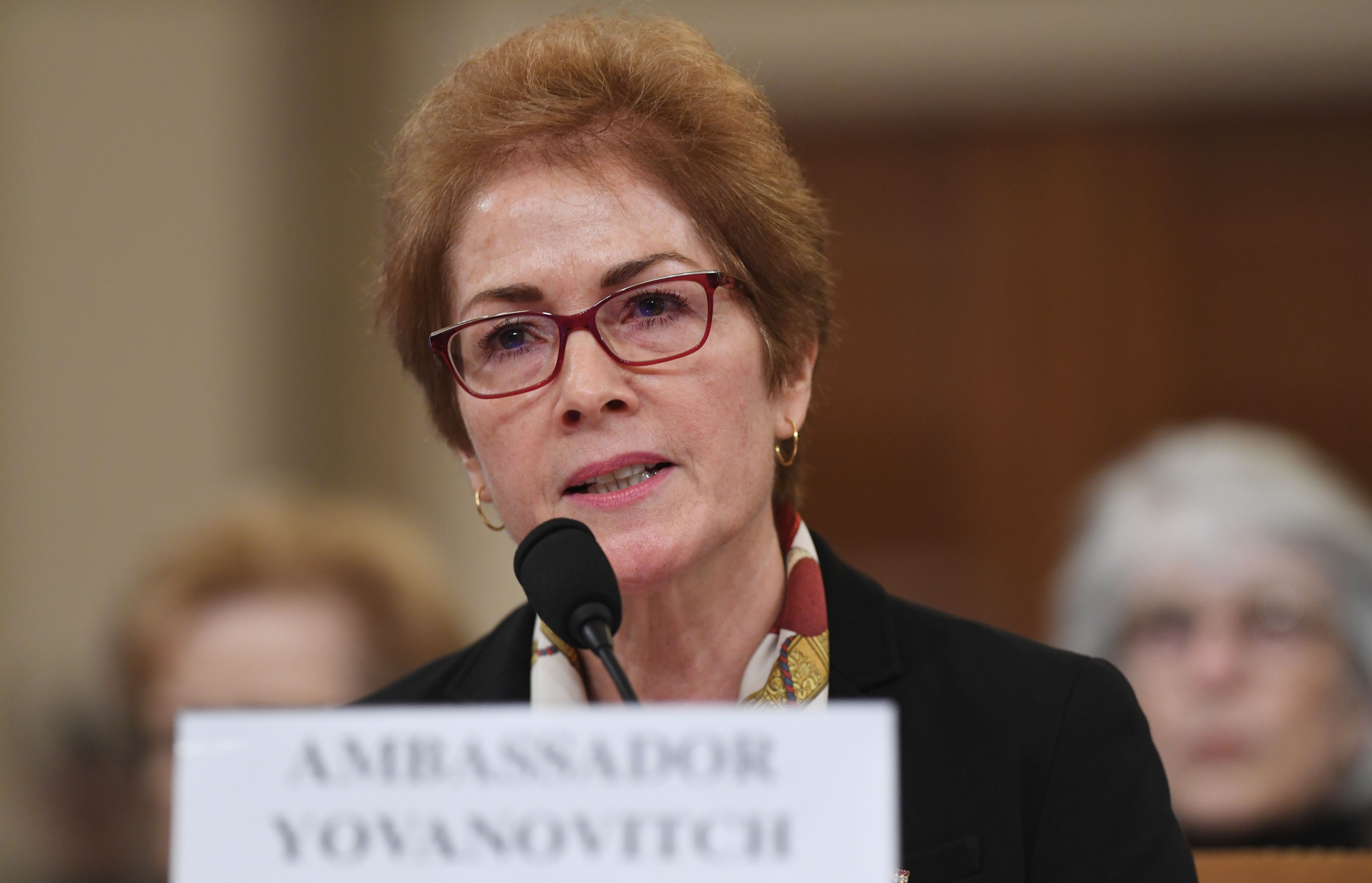
GettyFormer US Ambassador to the Ukraine Marie Yovanovitch during her November 15 testimony.
The impeachment inquiry into President Donald Trump’s phone calls with Ukrainian President began its public hearing phase this week with several key witnesses testifying before the House Intelligence Committee. The committee heard testimony from Bill Taylor, who also served as ambassador to Ukraine, and George Kent, the State Department’s Deputy Assistant Secretary for European and Eurasian Affairs, on Wednesday.
Former U.S. Ambassador to Ukraine Marie Yovanovitch testified on Friday, November 15. During her live testimony, Yovanovitch was attacked by President Donald Trump who tweeted, “Everywhere Marie Yovanovitch went turned bad. She started off in Somalia, how did that go? Then fast forward to Ukraine, where the new Ukrainian President spoke unfavorably about her in my second phone call with him. It is a U.S. President’s absolute right to appoint ambassadors.”
Several Democratic lawmakers said the president’s tweet amounted to witness intimidation. Rep. Eric Swalwell, a Democrat from California, told CNN that the House of Representatives, where the impeachment inquiry is being held, will “view that as witness intimidation not only to the ambassador but future witnesses who would come in.”
“Innocent people don’t intimidate witnesses. This is what guilty people do, and the president continues to act guilty,” he said.
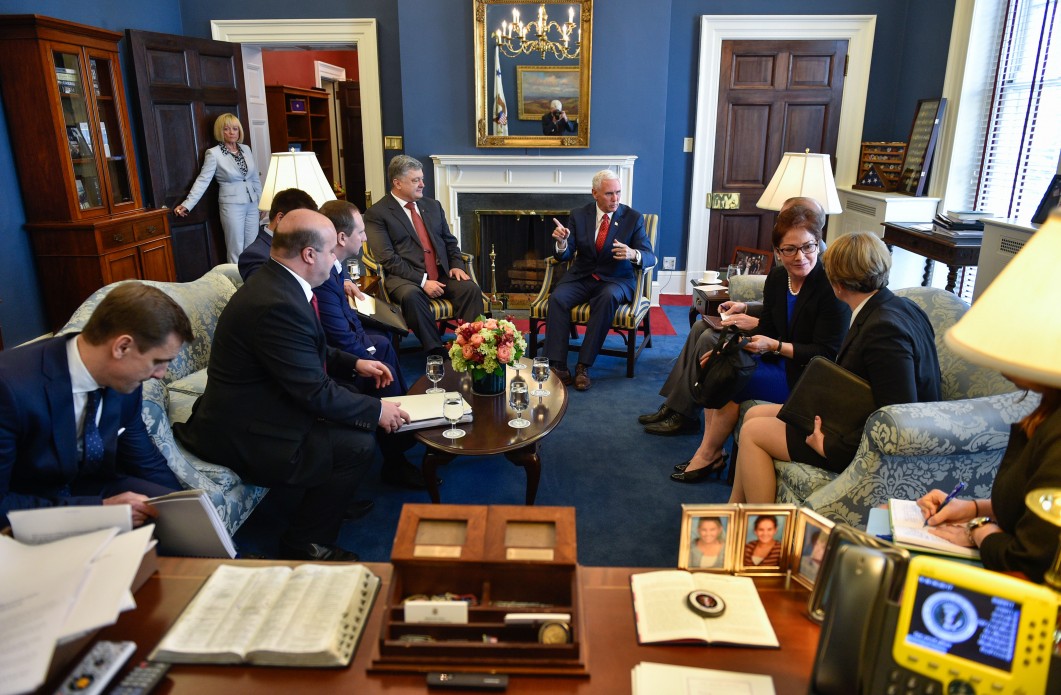
U.S. Ambassador to Ukraine Marie Yovanovitch at the White House in June 2017. Wikipedia Creative Commons
Trump later said on Fox & Friends:
“She wouldn’t hang my picture in the embassy. She is in charge of the embassy. She wouldn’t hang it. It look a year-and-a-half, two years to get the picture up. She said bad things about me … This was not an angel this woman, okay?”
Former U.S. Ambassador to Ukraine Marie Yovanovitch testified before the House Oversight and Reform, Foreign Affairs and Intelligence committees in a closed hearing on Oct. 11. She told lawmakers that U.S. Ambassador to the European Union Gordon Sondland told her to tweet a message of support for President Donald Trump in order to remain in her position.
She said Sondland told her that “you need to, you know, tweet out there that you support the President, and that all these are lies and everything else.” She also testified that Sondland said to her: “You know the president. Well, maybe you don’t know him personally, but you know, you know, the sorts of things that he likes. You know, go out there battling aggressively and, you know, praise him or support him.”
Read the transcript of her October 11 testimony here:
2. Marie Yovanovitch Was Abruptly Recalled to Washington in May and President Donald Trump Called Her ‘Bad News’ in a Phone Call to Ukrainian President Volodymyr Zelensky
According to a recently unclassified “Memorandum of Telephone Conversation” between President Donald Trump and Ukrainian President Volodymyr Zelensky on July 25, Trump said U.S. Ambassador to Ukraine Marie Yovanovitch was “bad news.”
Trump: The former ambassador from the United States, the woman, was bad news and the people she was dealing with in the Ukraine were bad news so I just want to let you know that.
Zelensky: On top of that, I would kindly ask you if you have any additional information that you can provide to us, it would be very helpful for the investigation to make sure that we administer justice in our country with regard to the Ambassador to the United States from Ukraine as far as I recall her name was Ivanovich. It was great that you were the first one who told me that she was a bad ambassador because I agree with you 100%. Her attitude towards me was far from the best as she admired the previous president and she was on his side. She would not accept me as a new president well enough.
Trump: Well, she’s going to go through some things.
Yovanovitch was abruptly recalled from her position as U.S. ambassador to Ukraine on May 20. According to Quartz:
“Yovanovitch started getting some political attention in March when she called on the Ukrainian government to do more to fight corruption. The Ukrainian government retaliated just a few weeks later—the nation’s top prosecutor claimed that Yovanovitch had given him a list of names that he should not prosecute. Republicans clamored for her recall, though multiple government sources told Foreign Policy that the claims were unfounded. Democrats spoke out in her favor, But in May, the Republicans prevailed; by the end of the month, Yovanovitch had been pushed from her post just two months before she was initially scheduled.”
Yovanovitch said she was visibly shaken when she learned that Trump was targeting her for removal from her post and had called her “bad news.”
“A person who saw me actually reading the transcript said that the color drained from my face. I think I even had a physical reaction. I think, you know, even now, words kind of fail me,” she said during her testimony on Friday.
“Shocked. Appalled. Devastated that the president of the United States would talk about any ambassador like that to a foreign head of state — and it was me. I mean, I couldn’t believe it,” she said.
“It sounded like a threat,” she said, when asked her reaction to Trump’s comment that “she’s going to go through some things.
“It’s very intimidating,” she said. “I can’t speak to what the president is trying to do, but the effect is to be intimidating.”
3. Marie Yovanovitch Is Currently a Senior State Department Fellow at Georgetown University in Washington, D.C.
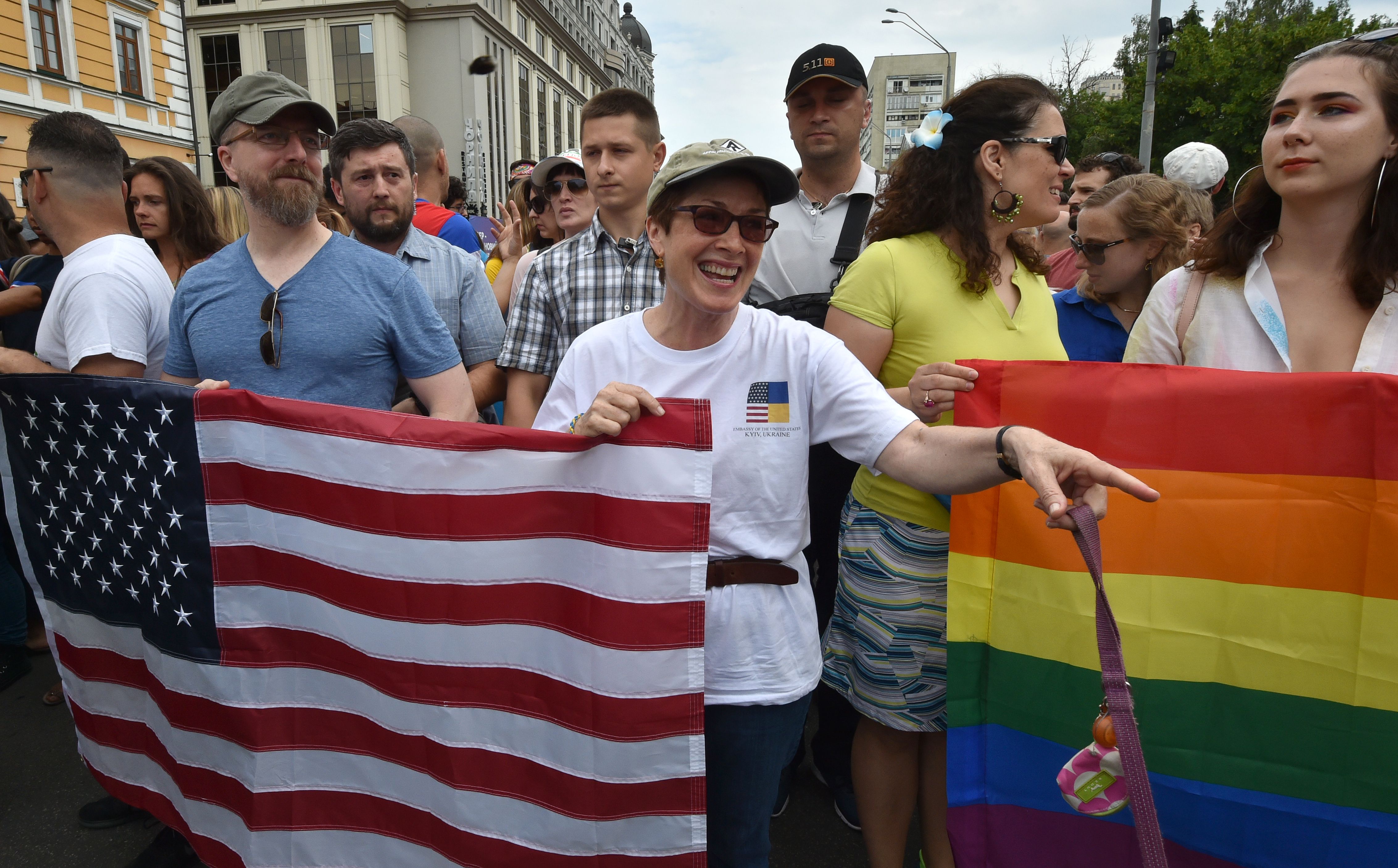
GettyYovanovitch takes part in the gay pride march in central Kiev on June 17, 2018.
After being recalled to Washington, D.C., from her post as U.S. ambassador to Ukraine, Marie Yovanovitch joined Georgetown University’s Institute for the Study of Diplomacy as a Senior State Department Fellow, according to her official bio for the school.
Yovanovitch has also served as the dean of the School of Language Studies at the Foreign Service Institute and deputy Commandant at the Eisenhower School at the National Defense University, where she taught national security strategy.
She earned a bachelor of arts degree in History and Russian from Princeton University in 1980. An older Department of State profile on Yovanovitch says that she studied at the Pushkin State Russian Language Institute in Moscow and that she has a Masters of Science from the War College in Washington D.C. The profile notes that Yovanovtich speaks Russian and French and was in the process of learning Armenian.
She is still employed by the State Department.
4. Yovanovitch Said Her Parents’ Lives Were Forever Changed by Communist & Nazi Regimes
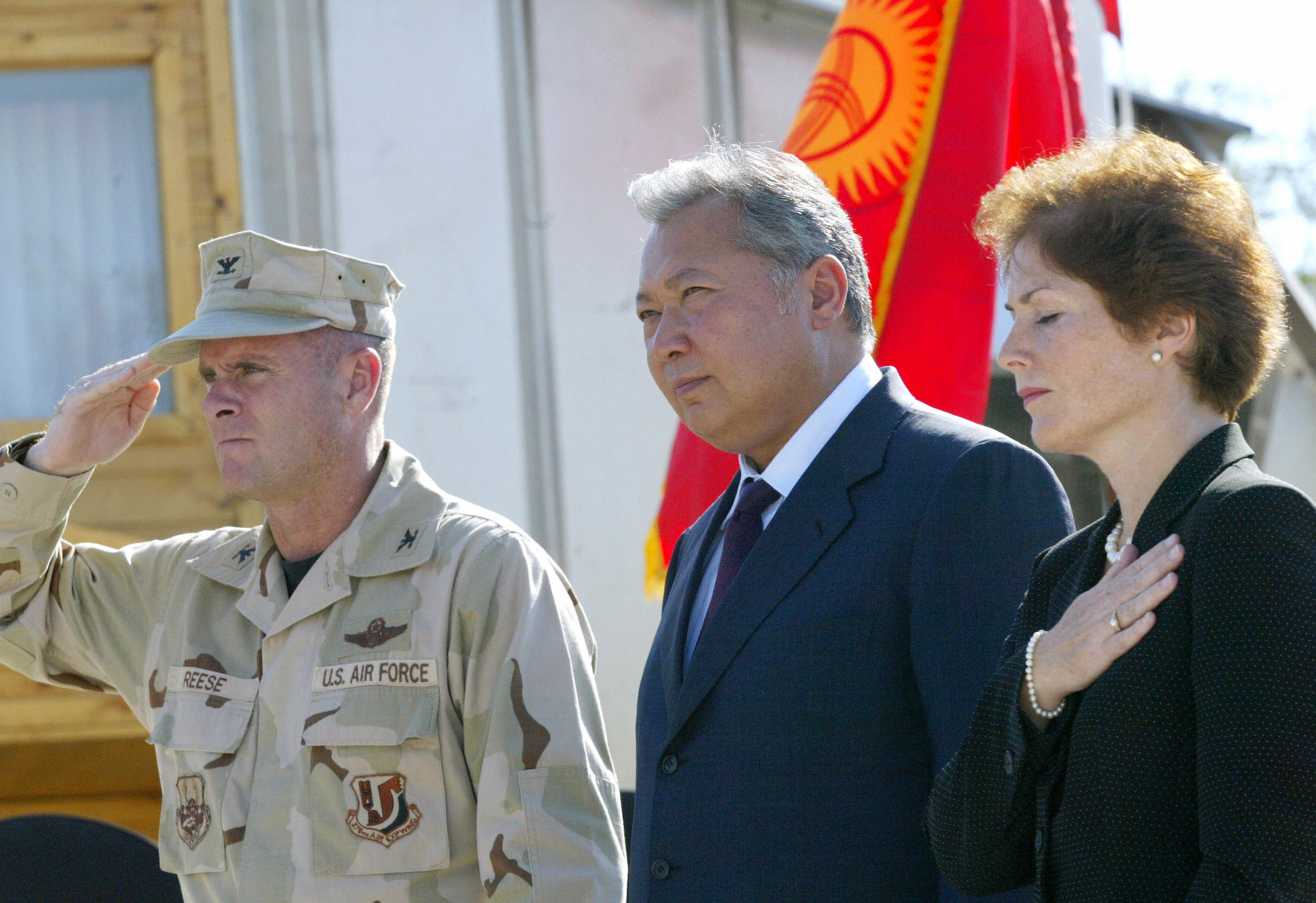
GettyKyrgyz Prezident Kurmanbek Bakiev (C), commander of the 375th Air Expeditionary Wing, colonel Joel Reese (L) and then-US ambassador to Kyrgyzstan Marie Yovanovitch attend a commemoration ceremony for the the victims of the September 11, 2001 attacks, at the US air base in Bishkek, 11 September 2006.
Yovanovitch said at her Senate confirmation in July 2016 when the Princeton-graduate was named as the U.S. Ambassador to Ukraine, “Like so many, including those in the Ukrainian American community, my parents’ lives were changed forever by Communist and Nazi regimes. They survived poverty, war, and displacement, and finally arrived in the United States, with me in tow, in search of freedom, opportunity, dignity and accountability. The very values that Ukrainians demanded in the 2014 Revolution of Dignity.”
Yovanovitch was accompanied by her 88-year-old mother during her confirmation. Yovanovitch added that she wishes her late father could have also attended as he “would have been so moved.”
5. Yovanovitch Has Served Under Every U.S. President Since Ronald Reagan During Her Career at the State Department
Marie Yovanovitch joined the U.S. Foreign Service in 1986, according to an official State Department bio. She has served under every president since President Ronald Reagan.
According to filings made by Yovanovitch upon her confirmation to be the U.S. Ambassador to Armenia, Yovanovitch disclosed that she donated to former Vice President Al Gore’s 2000 presidential campaign.
In her opening statement at Friday’s hearing, Yovanovitch said: “I come before you as an American citizen who has devoted the majority of my life, 33 years, to service the country that all of us love.”
She said it is an honor to serve her country, no matter who is in office. “We are professionals, public servants who by vocation and training pursue the policies of the president, regardless of who holds that office or what party they affiliate it,” she said.

